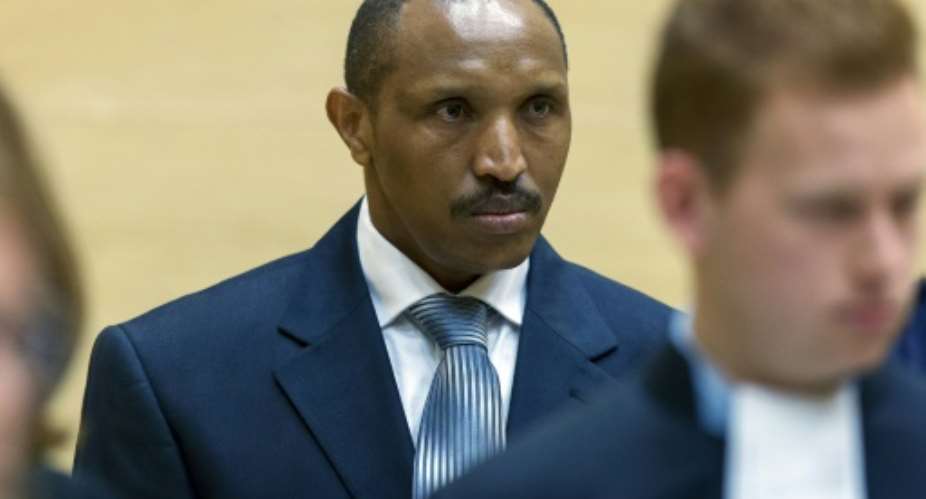Kinshasa (AFP) - War crimes suspect Bosco Ntaganda is the feared former commander of a ruthless rebel group that pillaged and raped in DR Congo's mineral-rich east, earning him the nickname "The Terminator."
Tall, smug, and said to be trigger-happy too, the 41-year-old Ntaganda fought for different rebel groups as well as for the Democratic Republic of Congo's army from his late teens.
He faces 18 counts of war crimes and crimes against humanity for the deaths of hundreds of villagers, rape, recruiting child soldiers, and keeping girls under 15 for himself as sex slaves.
The fifth former Congolese warlord in the dock before the International Criminal Court, he is the first to have given himself up as his M23 rebel army foundered and signed a peace deal with government troops in 2013.
His lawyer Stephane Bourgon describes him as a family man separated from his children "for over two years" who hasn't seen his wife in nine months which is "very hard on him."
Behind ICC bars he "keeps himself busy", says Bourgon, "regularly taking part in sports activities, reading a lot and going to English classes".
"He's also learning the piano," he added.
- 'Kills people easily' -
Born in 1973 in Rwanda but brought up in DR Congo, Ntaganda often criss-crossed the border, again leaving Rwanda in the 1980s for the eastern Congo as an adolescent following attacks on his fellow Tutsis.
In 1990, in his late teens, he joined the Rwandan Patriotic Front, which was based in Uganda at the time and which put an end to the 1994 Rwanda genocide, under current President Paul Kagame's leadership.
Since then Ntaganda has alternated between fighting in the national army and rebellions, including in the second five-year DR Congo war from 1998 to 2003 that drew in the entire region.
In an anecdote showing Ntaganda's willingness to get his hands dirty, one woman from Birambizo in North Kivu told HRW that Ntaganda himself visited her village to recruit.
"He asked us to give our children, our students, to him to fight. He came to our village himself," the woman said.
In the words of a child soldier who testified against Ntaganda in The Hague, he is known as someone who "kills people easily".
- 'Flaunting his impunity' -
The war crimes and crimes against humanity charges he faces are over violence committed in 2002 and 2003 in the Ituri region.
The ICC issued a warrant in 2006 but Ntaganda managed to evade arrest after becoming a powerful military commander for the National Congress for the Defence of the People (CNDP), an ethnic Tutsi rebel group in DR Congo led by Laurent Nkunda.
Their insurgency was ended by a peace deal that integrated the ex-rebels into the army. Ntaganda was made a general and began building a parallel command in the military.
He activated that network to help form the M23 in 2012 which turned away from President Joseph Kabila.
Kabila signalled he was ready to comply with the ICC warrant and have him arrested and Ntaganda eventually fled to Rwanda in 2013 when splits emerged with the M23.
Until then Ntaganda had "boldly walked around the restaurants and tennis courts of Goma flaunting his impunity like a medal of honour while engaging in ruthless human rights abuses," said HRW senior Africa researcher Anneke Van Woudenberg.
According to UN investigators, he managed to amass considerable wealth by running a large empire in North Kivu, manning rogue checkpoints and taxing the area's many mines.
One report said he once earned $15,000 a week from just one border crossing.





 Whoever participated in the plunder of the state must be held accountable – Jane...
Whoever participated in the plunder of the state must be held accountable – Jane...
 A vote for John and Jane is a vote to pull Ghana from the precipice of destructi...
A vote for John and Jane is a vote to pull Ghana from the precipice of destructi...
 I’ll repay your abiding confidence with loyalty, understanding and a devotion to...
I’ll repay your abiding confidence with loyalty, understanding and a devotion to...
 ‘I’ve learnt deeply useful lessons for the future' — Serwaa Amihere breaks silen...
‘I’ve learnt deeply useful lessons for the future' — Serwaa Amihere breaks silen...
 I’m sorry for the embarrassment – Serwaa Amihere apologises for leaked sex video
I’m sorry for the embarrassment – Serwaa Amihere apologises for leaked sex video
 Dumsor: Matthew Opoku Prempeh not in charge of Energy sector – Minority
Dumsor: Matthew Opoku Prempeh not in charge of Energy sector – Minority
 Adu Boahen’s murder: Police arrest house help who was in possession of deceased’...
Adu Boahen’s murder: Police arrest house help who was in possession of deceased’...
 Akufo-Addo nominates Felicia Attipoe as Tema West MCE
Akufo-Addo nominates Felicia Attipoe as Tema West MCE
 Election 2024: I can't have someone I defeated twice as my successor – Akufo-Add...
Election 2024: I can't have someone I defeated twice as my successor – Akufo-Add...
